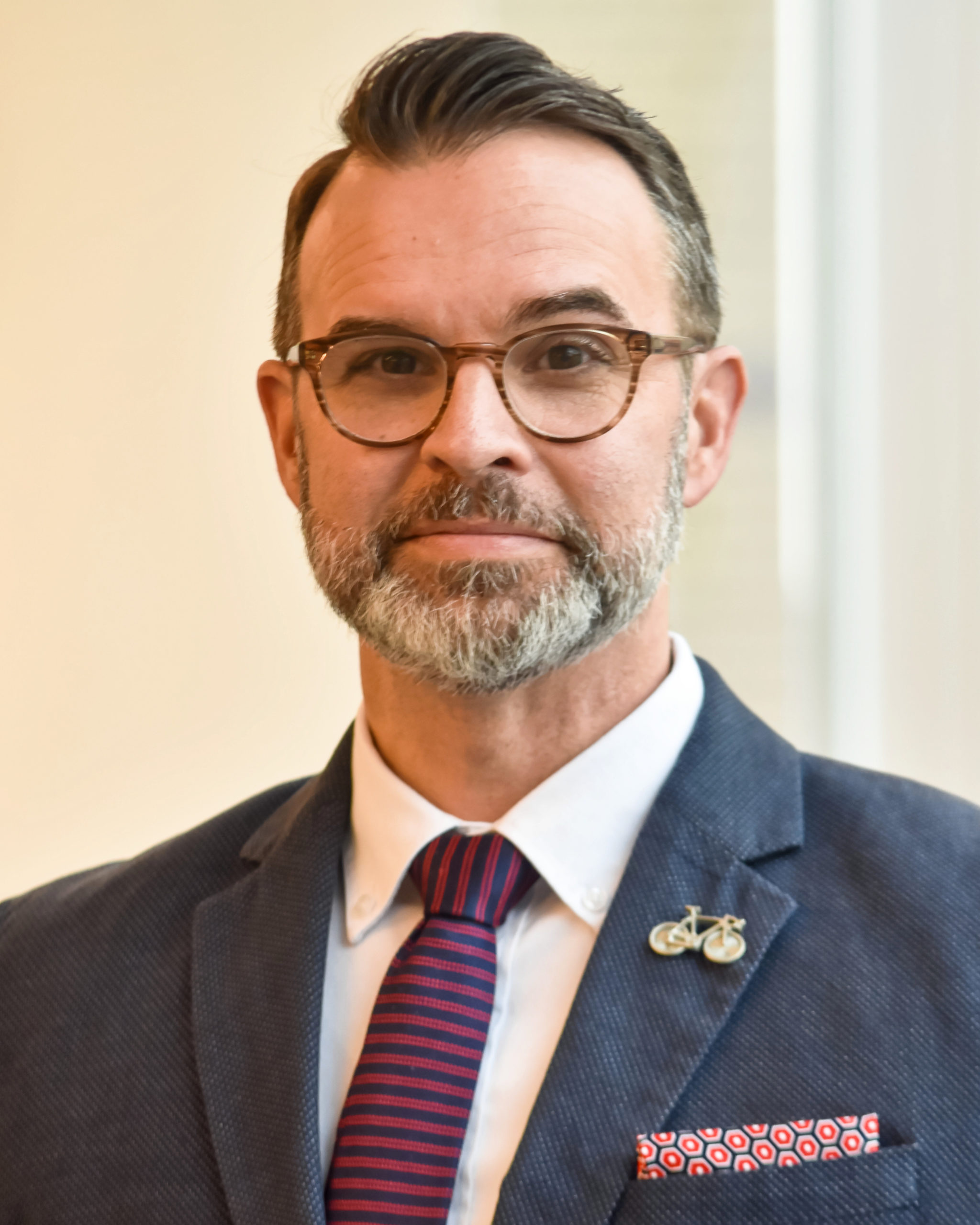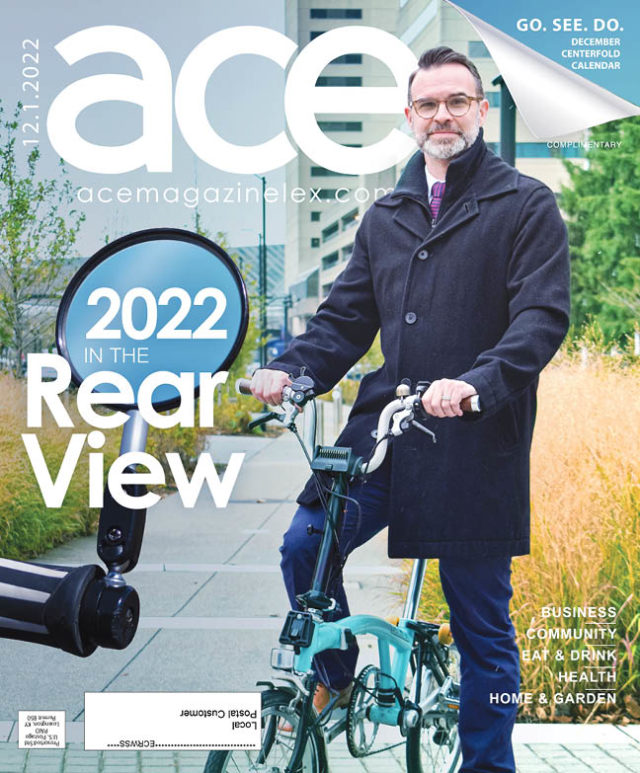By KEVIN NANCE
Mike Sewell was freaking out. Stuck in traffic in Indiana for nearly two hours one morning in 2011, late for a meeting with his boss in downtown Louisville, Sewell hopped a curb, abandoned his car and set off on foot over the Ohio River across the Second Street Bridge. A guy on a bicycle rode past him, rang his bell and said, “It’s a beautiful day, isn’t it?”
On that stressful mile-and-a-half trudge to his office at the architecture and engineering firm Gresham Smith, Sewell saw that it was a beautiful day, one that needn’t have been ruined by insane traffic issues. “I was overweight then, 20 pounds heavier than I am now, and I hadn’t been on my bike in a long time,” he recalls in a recent interview at Gresham Smith’s Lexington offices. “By the time I got to work that day, I decided that I wasn’t going to sit in traffic anymore. I’m going to use my bike.”


It was Sewell’s road-to-Damascus — er, road-to-Louisville — moment, an epiphany that spun his career as a transportation planning engineer at Gresham Smith in a new direction, helping to make him a nationally recognized expert in bike safety and multimodal transit systems. He testified before Congress on related issues in 2019 and is now in his second term on the board of the League of American Bicyclists, which advocates for people’s rights on bikes.
For most of the past decade he’s been focused on designing and consulting on bike-friendly transportation systems around the country, including Lexington’s recently completed Town Branch Commons, a paved trail network that cuts through the center of downtown along Vine Street and Midland Avenue. The Commons connects downtown to surrounding residential neighborhoods, linking the Town Branch and Legacy trails and putting pedestrians and bicyclists on a safer, more equitable footing with motorists.
“Mike’s very enthusiastic and a huge supporter of multimodal transportation facilities including Town Branch Commons,” says Brandi Peacher, director of project management in Mayor Linda Gorton’s office. “It’s a great way to accommodate all users and connect our people to one another.”

The ideas of connectivity and reducing inequity are at the center of Sewell’s evolved philosophy. He notes that urban planners from the 1930s, ’40s and ’50s tended to favor automobiles and high-volume vehicular traffic “efficiency” over all other modes of transit — a bias that lingers today among some policymakers at all levels of government.
“Some people are against bikes in general, and in some cities it’s called bikelash,” he says. “There’s just this nonsensical ownership of the public right-of-way, and an insistence that it should be just for cars. The thing that people forget about is that we have inequities in our transportation system. Some people can choose to own a car, but we have a huge subset of the population that cannot afford it, and they rely on other forms of transportation. We have to make sure that they can get around safely. And if you take care of everyone across the spectrum, we gain something as a society. A high tide raises all ships.”
Today, Sewell himself rides his fold-up bike (made by Brompton, a British company) to work every day, zipping through bike lanes and low-stress residential streets, and takes the bike with him on business trips around the world. It was on one of those trips — to the Netherlands in 2019 — when he had his second bike epiphany. “The transportation infrastructure there was so comfortable, so extremely intuitive,” he recalls. “They did not appear to have the same types of conflicts or confusion that we have on our local roadways, and I wanted to know why. I’m an engineer, and engineers like data.”
To collect that data, Sewell invented a new empathic analytics tool that can measure people’s heart rates as they walk or ride a bicycle around a city. “I trained an algorithm to detect when people exhibit stress,” he explains. “It’s like fight-or-flight mechanisms when you have a freakout moment where you believe you’re in danger. It does a really good job of tracking that in people commuting on bikes or walking. It then aggregates that onto a map, letting you identify and intervene at your highest-stress locations across your city.”
Now patented (and the recipient of a research-and-development award from Architect Magazine), Sewell’s invention is already in use by about a dozen civic entities and universities in cities around the world, including Louisville, Denver, Dallas, Nashville, Amsterdam and Delft. He envisions the platform also being used by hospitals looking to identify burnt-out healthcare workers, or by nursing homes caring for war veterans.
In recognition of his work, Sewell is now in charge of Gresham Smith’s Studio X, a new team that incubates and develops innovative new ideas from the firm’s staff for potential introduction into the marketplace.
It’s a beautiful day, isn’t it?
About Town Branch Commons
Construction for Town Branch Commons kicked off in early 2020, and project manager Mike Sewell told Ace at the time it was “progressing very well.”
On October 13, 2022, a decade-long journey concluded with a ribbon cutting, officially celebrating the opening of the Town Branch Commons Trail.
Mayor Linda Gorton, Governor Andy Beshear, former Mayor Jim Gray, and Congressman Andy Barr joined a crowd of enthusiastic walkers, cyclists, and neighbors for the festivities.
“This trail is a path to economic vitality, to healthy living, and to our beautiful Bluegrass countryside,” Mayor Linda Gorton said. “It’s the kind of quality of life investment that people in Lexington treasure and visitors travel here to enjoy.”
Trail construction cost $22 million with additional funding coming from local resources and state or federal grants.








